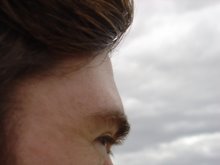There is a place I know, a little farmstead, where a fellowship of remarkable young men and women - or maybe not so young, any more - have made a home and a life for themselves. They aren't farmers. They're what are classically considered "intelligentsia," holders of advanced degrees, specialists in information and complex theories and books and generally things which are not soil. They're the step-siblings of the World Wide Web, and yet they've made themselves self-sufficient in an agrarian model that's been very nearly lost in modern America, and all without cutting themselves off from the outside world or even from "real" jobs in "real" places.
By sharing between their several small households the duties and costs of subsistence agriculture, these happy visionaries are able to operate the intensively, intelligently managed acres of their shared property as only part-time farmers. In the rest of their time, they each have their own pursuits - some are parents, true, but there are also researchers, teachers, programmers, managers, authors, and artists. It's a small enclave, four or five families at most, but they're an eclectic lot. In their spare time - and yes, there is spare time - they're musicians, gamers, crafters, readers and writers, cooks and bakers, and upstanding members of online communities.
The farm doesn't run itself. Like the now-famous Salatin farm featured in Michael Pollan's remarkable The Omnivore's Dilemma, it's an intensively-managed sustainable outfit which strives to minimize external input and maximize the health and long-term output of the land it occupies. Of the hundreds of acres of land owned in common by the families of this enterprise, only a relatively small percentage are cultivated, the rest left as woodlands to collect sun, block wind, and preserve soil. The Ranch produces only what its occupants need, and is thus spared the complications of commercial agriculture. It's an idyllic place to the casual observer. It would undoubtedly be no more than it appears, were it not piped in at high speed to the whole world.
***
So you know, in case you haven't guessed, I know this place, this haven, so well because it exists, thus far, only in my imagination - and in the future.
The Ranch is my vision. I dream of a place and a day when I can live where I please, uncrowded, thanks to the beneficence of the Information Age. People say we live in that Age now, but they're wrong; it's coming, but still nascent at best. Between Moore's Law and the beginning of rural broadband - the modern rural electrification - we've only barely begun to see the potential of a truly connected society. With projects in the works as diverse and exciting as quantum computing and a semantic web, the world as we know it is destined to change at an ever-accelerating rate. It won't - shouldn't, at least - be long before physical localization is entirely irrelevant to information-based occupations. If my hopes, and not unreasonable ones, are borne out, the day when a teacher or a librarian can work from home - a home which can be anywhere in the world - and be every bit as effective as if they were working in person is not far off.
The revolution which will end the commute is the same one which will enable the revival of small-scale agriculture and the emergence of the part-time farmer. I am by no means heralding the death of cities; on the contrary, I expect future emergences to create ever-denser population centers. At the same time, however, there is a class which does not need to be physically present to contribute to society, and I count myself among them. The day is coming soon, with any luck, in which I will be able to abandon entirely the tiresome necessity of driving around a concrete wilderness, and return to the natural world by the grace of the virtual.
Wednesday, March 25, 2009
Subscribe to:
Posts (Atom)

